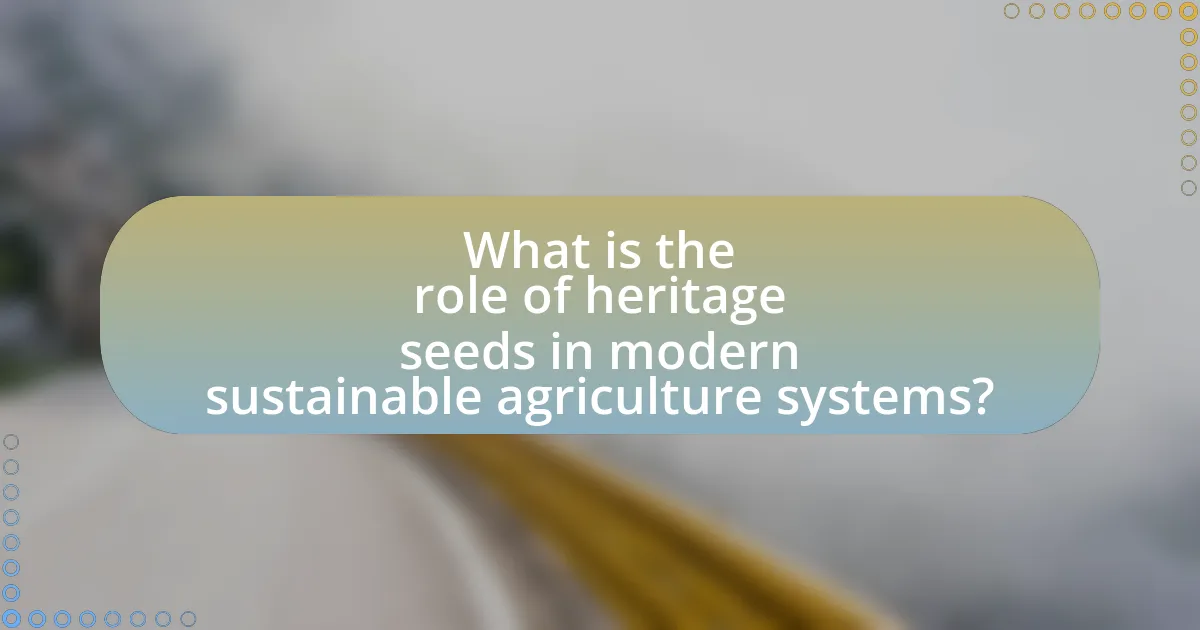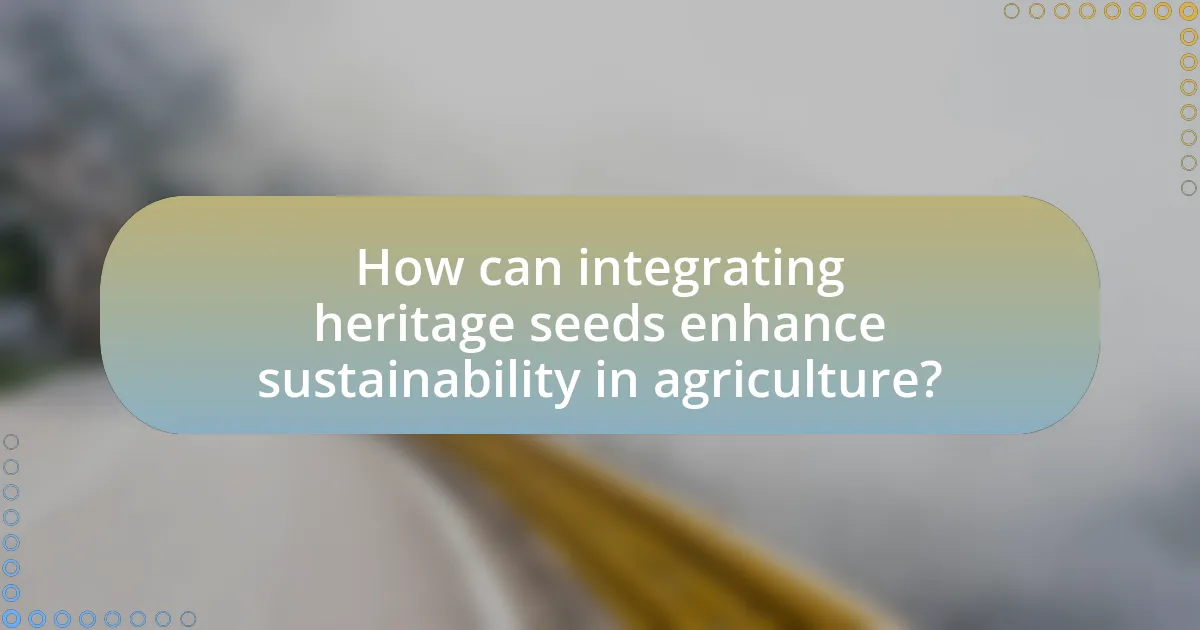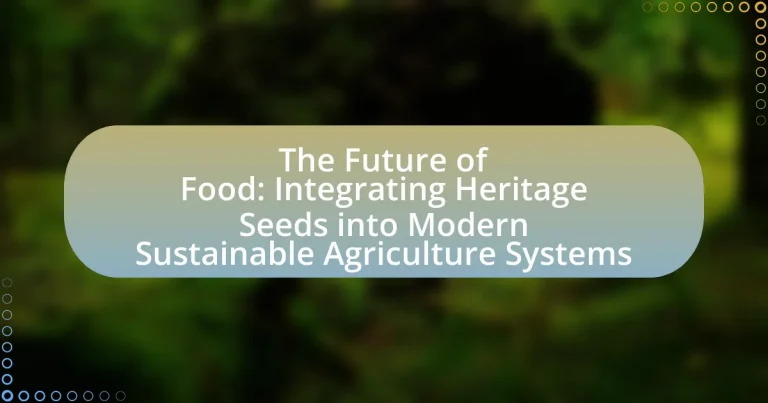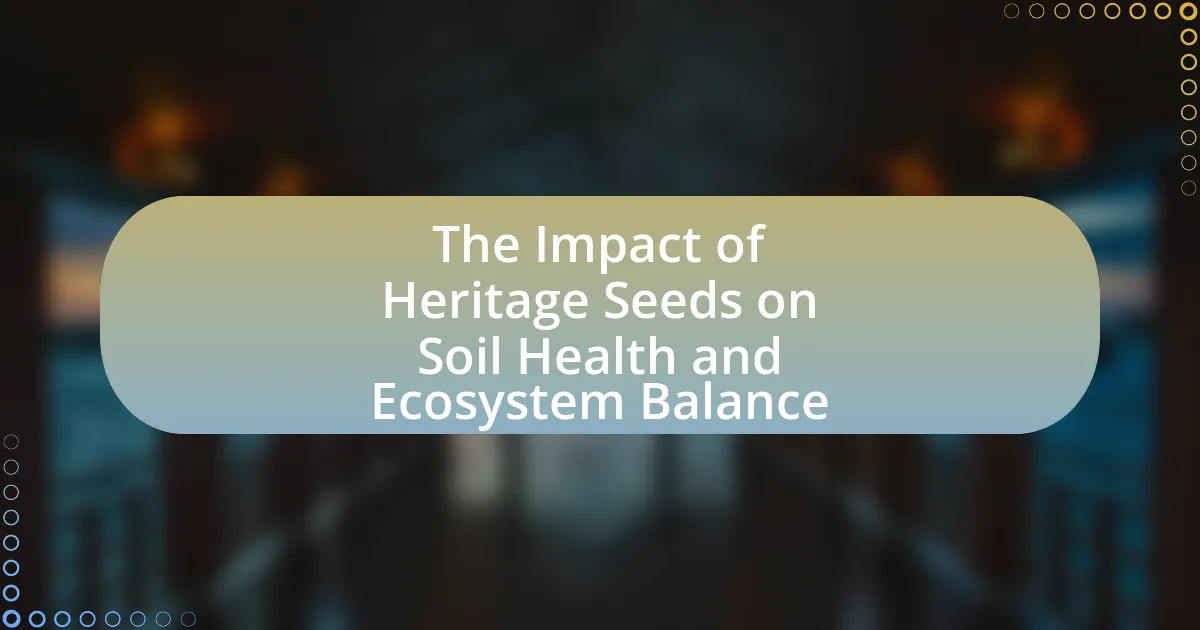Heritage seeds are traditional, open-pollinated varieties that play a vital role in modern sustainable agriculture by enhancing biodiversity and resilience in crop production. This article explores the unique characteristics of heritage seeds, their differences from conventional seeds, and their importance for biodiversity and soil health. It also addresses the challenges heritage seeds face in contemporary agriculture, including market pressures and regulatory hurdles, while highlighting strategies to promote their use. Additionally, the article discusses how integrating heritage seeds can improve sustainability, support climate resilience, and provide practical steps for farmers to effectively manage these valuable resources.

What is the role of heritage seeds in modern sustainable agriculture systems?
Heritage seeds play a crucial role in modern sustainable agriculture systems by promoting biodiversity and resilience in crop production. These seeds, which are open-pollinated and often heirloom varieties, contribute to genetic diversity, allowing farmers to adapt to changing environmental conditions and pests. Research indicates that using heritage seeds can enhance soil health and reduce dependency on chemical inputs, as these varieties are often more resilient to local climates and diseases. For example, a study published in the journal “Agriculture, Ecosystems & Environment” found that farms utilizing heritage seeds had improved yields and reduced pesticide use, demonstrating their effectiveness in sustainable practices.
How do heritage seeds differ from conventional seeds?
Heritage seeds differ from conventional seeds primarily in their genetic diversity and breeding practices. Heritage seeds are open-pollinated varieties that have been passed down through generations, maintaining their genetic traits and adaptability to local environments. In contrast, conventional seeds are often hybridized or genetically modified, focusing on traits like uniformity and resistance to pests, which can reduce genetic diversity. Studies show that heritage seeds can enhance biodiversity and resilience in agriculture, as they are better suited to withstand climate variations and diseases, thereby supporting sustainable farming practices.
What are the unique characteristics of heritage seeds?
Heritage seeds are characterized by their genetic diversity, adaptability to local conditions, and ability to be saved and replanted by farmers. These seeds have been passed down through generations, often retaining traits that are well-suited to specific climates and soils, which enhances their resilience against pests and diseases. Additionally, heritage seeds are open-pollinated, meaning they can reproduce true to type, allowing farmers to maintain seed stocks without needing to purchase new seeds each season. This practice supports biodiversity and sustainable agriculture, as evidenced by studies showing that heritage varieties can outperform modern hybrids in certain environments due to their robust genetic traits.
Why are heritage seeds important for biodiversity?
Heritage seeds are crucial for biodiversity because they preserve genetic diversity within plant species, which is essential for ecosystem resilience and adaptability. These seeds represent a wide range of traits that can contribute to disease resistance, climate adaptability, and nutritional value. For instance, a study by the Food and Agriculture Organization (FAO) highlights that traditional varieties of crops can withstand environmental stresses better than modern hybrids, thus ensuring food security in changing climates. By maintaining a diverse gene pool, heritage seeds help safeguard against the loss of species and promote sustainable agricultural practices.
What challenges do heritage seeds face in contemporary agriculture?
Heritage seeds face significant challenges in contemporary agriculture, primarily due to market pressures favoring hybrid and genetically modified organisms (GMOs). These market dynamics often lead to reduced availability and support for heritage seeds, as commercial growers prioritize higher-yielding varieties that may not possess the same genetic diversity or resilience. Additionally, heritage seeds are often less suited to mechanized farming practices, which can limit their adoption in large-scale agricultural systems. The loss of traditional farming knowledge and practices further exacerbates these challenges, as fewer farmers are familiar with the cultivation and benefits of heritage varieties. According to a report by the Food and Agriculture Organization, over 75% of crop diversity has been lost since the 1900s, highlighting the urgent need to address these challenges to preserve agricultural biodiversity and food security.
How do market demands affect the use of heritage seeds?
Market demands significantly influence the use of heritage seeds by driving farmers to prioritize crops that align with consumer preferences and trends. As consumers increasingly seek organic, non-GMO, and locally sourced products, farmers are more likely to adopt heritage seeds that meet these criteria. For instance, a report by the Organic Trade Association indicates that organic food sales reached $62 billion in 2020, reflecting a growing market for heritage varieties that are often organic and traditional. This shift in consumer demand encourages agricultural practices that preserve biodiversity and promote sustainable farming, as heritage seeds are typically more resilient and adapted to local conditions.
What are the regulatory hurdles for heritage seed cultivation?
Heritage seed cultivation faces several regulatory hurdles, primarily related to seed certification, intellectual property rights, and compliance with agricultural standards. Seed certification processes often require extensive documentation and testing to ensure genetic purity and disease resistance, which can be challenging for small-scale farmers who cultivate heritage varieties. Additionally, intellectual property laws, such as patents and plant variety protection, can restrict the use and sharing of heritage seeds, limiting farmers’ rights to save and replant seeds. Compliance with agricultural standards, including those set by government agencies, can impose further restrictions on the cultivation and sale of heritage seeds, making it difficult for farmers to navigate the regulatory landscape.

How can integrating heritage seeds enhance sustainability in agriculture?
Integrating heritage seeds enhances sustainability in agriculture by promoting biodiversity, improving soil health, and increasing resilience to climate change. Heritage seeds, which are traditional varieties that have been cultivated over generations, contribute to genetic diversity, allowing ecosystems to adapt to changing conditions and pests. Studies show that diverse cropping systems can lead to better soil structure and fertility, as these seeds often require fewer chemical inputs and are more resilient to environmental stressors. For instance, research published in the journal “Agriculture, Ecosystems & Environment” highlights that farms using heritage seeds can reduce reliance on synthetic fertilizers and pesticides, leading to more sustainable farming practices.
What benefits do heritage seeds provide for soil health?
Heritage seeds enhance soil health by promoting biodiversity and improving soil structure. These seeds are often adapted to local conditions, which helps maintain a diverse ecosystem that supports beneficial microorganisms. Research indicates that diverse plant varieties can lead to improved nutrient cycling and increased organic matter in the soil, which enhances soil fertility. Additionally, heritage seeds typically require fewer chemical inputs, reducing soil contamination and promoting a healthier soil microbiome. Studies have shown that farms utilizing heritage seeds can experience better soil moisture retention and reduced erosion, contributing to overall soil health.
How do heritage seeds contribute to soil biodiversity?
Heritage seeds contribute to soil biodiversity by promoting a diverse range of plant genetics that enhance soil health and ecosystem resilience. These seeds, often adapted to local conditions, support a variety of soil microorganisms, which play crucial roles in nutrient cycling and soil structure. Research indicates that diverse plant species can improve soil organic matter and microbial diversity, leading to healthier soils. For instance, a study published in the journal “Agriculture, Ecosystems & Environment” found that fields planted with diverse heritage crops had significantly higher levels of beneficial soil microbes compared to monoculture systems. This increased microbial diversity is essential for maintaining soil fertility and combating pests and diseases, ultimately supporting sustainable agricultural practices.
What practices can enhance soil health through heritage seed use?
Heritage seed use can enhance soil health through practices such as crop rotation, intercropping, and organic amendments. Crop rotation with heritage varieties improves soil structure and nutrient cycling, as different plants contribute varying organic matter and root structures, which can enhance microbial diversity. Intercropping, or planting multiple crops together, can reduce soil erosion and increase nutrient availability by utilizing different root depths and nutrient uptake strategies. Additionally, applying organic amendments like compost or green manure from heritage crops enriches soil fertility and promotes beneficial microbial activity, leading to improved soil health. These practices are supported by studies indicating that diverse cropping systems can lead to better soil quality and resilience against pests and diseases.
How do heritage seeds support climate resilience in agriculture?
Heritage seeds support climate resilience in agriculture by preserving genetic diversity that enables crops to adapt to changing environmental conditions. These seeds are often well-suited to local climates and soil types, making them more resilient to pests, diseases, and extreme weather events. For example, a study published in the journal “Agricultural Systems” found that heritage varieties exhibited greater drought resistance compared to modern hybrids, demonstrating their potential to thrive under climate stress. This adaptability not only helps maintain crop yields but also supports biodiversity, which is crucial for ecosystem stability in the face of climate change.
What adaptations do heritage seeds have to local climates?
Heritage seeds exhibit adaptations to local climates through traits such as drought resistance, pest tolerance, and temperature resilience. These seeds have evolved over generations in specific environments, allowing them to thrive under local conditions. For instance, certain heritage varieties may have deeper root systems that enable them to access water during dry spells, while others may possess natural defenses against local pests, reducing the need for chemical interventions. Research indicates that these adaptations enhance biodiversity and contribute to sustainable agricultural practices, as they are better suited to withstand climate variability and promote ecosystem health.
How can farmers utilize heritage seeds to combat climate change effects?
Farmers can utilize heritage seeds to combat climate change effects by selecting varieties that are more resilient to changing environmental conditions. Heritage seeds often possess traits such as drought resistance, pest tolerance, and adaptability to local climates, which can enhance crop survival and yield under stress. For instance, studies have shown that traditional varieties of crops like maize and beans can outperform modern hybrids in specific local conditions, thereby ensuring food security even as climate variability increases. By preserving and planting these seeds, farmers can maintain biodiversity, which is crucial for ecosystem resilience and can help mitigate the impacts of climate change on agriculture.

What strategies can be employed to promote the use of heritage seeds in agriculture?
To promote the use of heritage seeds in agriculture, strategies such as education and awareness campaigns, financial incentives for farmers, and partnerships with local organizations can be employed. Education initiatives can inform farmers and consumers about the benefits of heritage seeds, including their resilience and biodiversity, which are crucial for sustainable agriculture. Financial incentives, such as grants or subsidies, can encourage farmers to adopt heritage seeds by offsetting initial costs. Collaborating with local organizations can facilitate community-based seed exchanges and workshops, fostering a culture of heritage seed preservation and use. These strategies are supported by evidence showing that regions with active heritage seed programs report increased biodiversity and improved crop resilience.
How can education and awareness increase the adoption of heritage seeds?
Education and awareness can significantly increase the adoption of heritage seeds by informing farmers and consumers about their benefits, such as biodiversity, resilience to climate change, and nutritional value. When agricultural education programs incorporate heritage seeds into their curricula, they provide farmers with practical knowledge on cultivation techniques and the advantages of using these seeds over commercial hybrids. Research indicates that farmers who receive training on heritage seed varieties are more likely to adopt them, as they understand their unique characteristics and advantages. Additionally, awareness campaigns can engage consumers, highlighting the importance of heritage seeds in preserving local food systems and cultural heritage, thereby creating market demand. Studies show that increased consumer interest in heritage foods can drive farmers to adopt these seeds, as they seek to meet market preferences.
What role do agricultural extension services play in promoting heritage seeds?
Agricultural extension services play a crucial role in promoting heritage seeds by providing farmers with education, resources, and support to cultivate and preserve these traditional varieties. These services facilitate knowledge transfer about the benefits of heritage seeds, such as their adaptability to local conditions and their contribution to biodiversity. For instance, studies have shown that extension programs that focus on heritage seeds can increase farmers’ awareness and adoption rates, leading to improved crop resilience and food security. By conducting workshops, demonstrations, and field trials, agricultural extension services empower farmers to make informed decisions about seed selection, ultimately fostering the conservation of heritage seeds within sustainable agricultural systems.
How can community initiatives support heritage seed preservation?
Community initiatives can support heritage seed preservation by creating local seed banks and organizing educational programs. These initiatives enable communities to collect, store, and share heritage seeds, ensuring genetic diversity and resilience in local agriculture. For example, the Seed Savers Exchange, a community-driven organization, has successfully preserved thousands of heirloom varieties through member participation and seed swaps. This model demonstrates how grassroots efforts can effectively maintain and promote the use of heritage seeds, contributing to sustainable agricultural practices and food security.
What are the best practices for integrating heritage seeds into modern farming systems?
The best practices for integrating heritage seeds into modern farming systems include selecting appropriate varieties, ensuring genetic diversity, and employing sustainable agricultural techniques. Selecting heritage seed varieties that are well-suited to local climates and soil conditions enhances resilience and productivity. Ensuring genetic diversity within crops helps mitigate risks associated with pests and diseases, as diverse genetic traits can provide natural resistance. Employing sustainable agricultural techniques, such as crop rotation, organic fertilization, and minimal tillage, supports soil health and reduces dependency on chemical inputs. These practices are supported by research indicating that diverse cropping systems can lead to improved yields and ecological balance, as demonstrated in studies by the Food and Agriculture Organization (FAO) and various agricultural universities.
How can farmers effectively manage heritage seed varieties in their crops?
Farmers can effectively manage heritage seed varieties in their crops by implementing practices such as seed saving, crop rotation, and organic farming techniques. Seed saving allows farmers to preserve the genetic diversity of heritage seeds, ensuring their availability for future planting. Crop rotation helps maintain soil health and reduces pest and disease pressure, which is crucial for the sustainability of heritage varieties. Organic farming techniques, including the use of natural fertilizers and pest control methods, support the growth of these seeds without the adverse effects of synthetic chemicals. Research indicates that heritage seeds often exhibit resilience to local environmental conditions, making them a valuable asset in sustainable agriculture.
What resources are available for farmers interested in heritage seeds?
Farmers interested in heritage seeds can access a variety of resources, including seed banks, agricultural extension services, and online databases. Seed banks, such as the Seed Savers Exchange, preserve a wide range of heritage seed varieties and provide them to farmers. Agricultural extension services offer educational programs and workshops focused on heritage seed cultivation, helping farmers understand best practices. Online databases, like the USDA’s National Plant Germplasm System, provide detailed information on heritage seed varieties, including their characteristics and growing conditions. These resources collectively support farmers in integrating heritage seeds into sustainable agriculture systems.
What practical steps can farmers take to successfully integrate heritage seeds?
Farmers can successfully integrate heritage seeds by first selecting varieties that are well-suited to their local climate and soil conditions. This selection process involves researching and sourcing heritage seeds from reputable suppliers or seed banks that specialize in traditional varieties.
Next, farmers should implement crop rotation and companion planting strategies to enhance biodiversity and soil health, which are critical for the successful growth of heritage seeds. Additionally, they can adopt organic farming practices to maintain the integrity of the seeds and the surrounding ecosystem.
Farmers should also engage in seed saving, which involves collecting seeds from their best-performing plants to ensure the continuity of heritage varieties. This practice not only preserves genetic diversity but also reduces dependency on commercial seed sources.
Furthermore, participating in local agricultural networks or community-supported agriculture (CSA) programs can provide farmers with valuable resources and support for integrating heritage seeds. These networks often facilitate knowledge sharing and collaboration among farmers who are also interested in sustainable practices.
Lastly, educating themselves and their communities about the benefits of heritage seeds can foster a supportive environment for their use, promoting a shift towards more sustainable agricultural systems.




